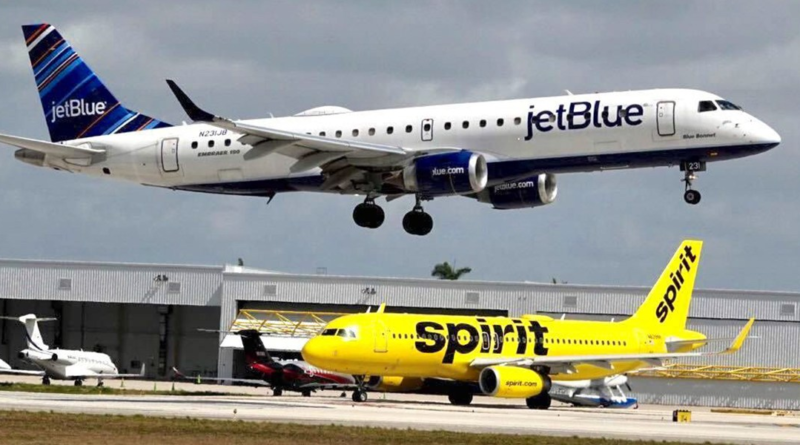Spirit Airlines CEO, still salty after its failed JetBlue merger, calls the airline industry a ‘rigged game’ and consumers ‘the long-term losers’
Spirit Airlines’ bid to make it to the big leagues in the American airline business—a proposed $3.8 billion takeover bid from JetBlue that Spirit says would have made it more competitive with industry leaders such as Delta and United—fell apart in March after running into a Department of Justice lawsuit. Months later, CEO Ted Christie III is still bitter.
“Today, nearly all the profits of the entire U.S. airline industry are concentrated in just two companies, while the smaller non-legacy carriers scrambled to restore profitability in what seems ever more like a rigged game,” Christie said in an earnings call Monday. “The Big Four [Delta, United, Southwest, and American] are the beneficiaries in this new normal. American consumers are the long-term losers.”
Spirit got its start in the early ’80s, flying passengers on charter routes to and from casinos in Las Vegas and Atlantic City. Eventually, it rebranded as a commercial operator with a fleet of planes painted its signature yellow, and revenues climbed throughout the 2010s as customers flocked to its business model of offering rock-bottom prices with few frills and high fees for add-ons such as checked bags.
But even as Spirit and other smaller operators have gained market share, there’s a huge gap between them and the largest carriers, who together control nearly 70% of the American market. Delta, United, Southwest, and American have staked out a dominant position atop the airline industry, which is currently the most consolidated it’s ever been in its 100-year history.
As Christie sees it, the government isn’t doing anything to help—in fact, it’s actively blocking competition by intervening in mergers such as the Spirit-JetBlue deal.
“We still feel strongly it was a serious misreading of both the evidence and the law for the federal court to enjoin our merger with JetBlue. And aside from the waste of taxpayer funds and the damage done to two proud companies through this process, the fact that DOJ even brought a case to block a merger between two carriers with less than 8% combined market share just shows how uninformed the government is about our dynamic airline business, particularly in the post-COVID era,” Christie said.
The federal government diverted some $54 billion in funding to commercial airlines during the pandemic, much of it to the Big Four operators. Government loans and subsidies aside, Christie pointed out that the Big Four airlines lean heavily on international routes and bank partnerships to stay afloat.
“If you strip away what appears to be a very lucrative transatlantic market and the credit card–based revenue of the loyalty programs of the bigger airlines, if you take those things out, they’re losing money,” Christie said.
Spirit’s stock plunged by 10% following its earnings release, in which it projected a 2% hit to its margins this year and cited weakness in its revenues from the Central and Latin American markets.
“The first quarter was a bit of an emotional roller coaster,” said CFO Scott M. Haralson.
Christie argued that a Spirit-JetBlue merger would have presented a legitimate competitive challenge to the dominant airlines—each company currently controls around 5% of the domestic market, meaning their combined share would be about half of each of the Big Four carriers. Airline consolidation has largely helped customers in the form of cheaper tickets: Airfares are down more 30% on average over the past 25 years, according to federal data. The airline industry also offers roughly 50% more seat miles—a statistic that takes into account both new routes and flight frequency—than it did in 2000. But the number of flights that are delayed, around 20%, hasn’t budged for a decade.




